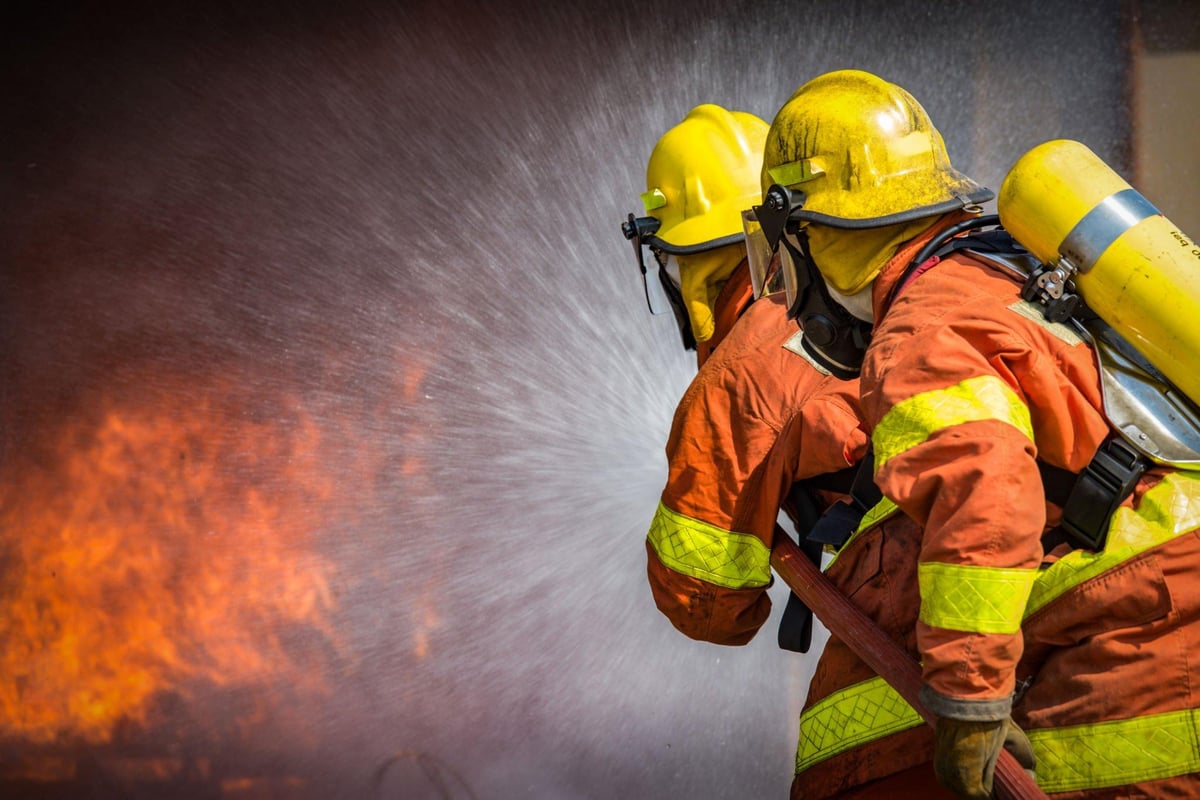Fire Science classes near me in Madison
In the Madison metro area, the average cost of a class is $11500 and the average class length is approximately 47 weeks long
Trade and industry classes near
Madison, WI 53703Online classes
Financial aid
Certificate
Short classes

Liberty University Online
BS: Civil Engineering
- Online, completion in as little as 42 months.
- Option to transfer credits for up to 75% of the entire degree.

Liberty University Online
BS: Aviation Management
- Online, completion in as little as 42 months.
- Option to transfer credits for up to 75% of the entire degree.

Waldorf University
AA Occupational Safety & Health
- Online, estimated completion in 2 years for full-time students
- Covers industrial hygiene, occupational safety, and more
Fire Science classes near me in Madison
Are you interested in a career in firefighting? Do you want to make a difference in your community and help save lives? If so, then Fire Science classes may be the perfect fit for you. In this blog post, we will explore what Fire Science is, the training requirements, what to look for in a class, what to expect from the day-to-day class, the certification process, how to find related jobs, and other classes you can take after becoming a Fire Science professional.

Introduction
Fire Science is the study of fire behavior, prevention, and suppression. It encompasses a range of skills and knowledge necessary for a career in firefighting. Firefighters play a vital role in emergency response, protecting lives and property from the devastating effects of fires.
What is Fire Science?
Fire Science is a multidisciplinary field that combines elements of engineering, chemistry, and physics to understand how fires start, spread, and can be controlled. It involves studying fire behavior, fire prevention techniques, and the use of firefighting equipment and tactics.
Training Requirements
To become a firefighter, you will need to complete a Fire Science training program. These programs are typically offered at community colleges, technical schools, or fire academies. The training requirements may vary depending on the state or municipality you plan to work in, but generally include the following:
- Basic Firefighter Training: This includes classroom instruction and hands-on training in firefighting techniques, rescue operations, and hazardous materials handling.
- Emergency Medical Training: Many fire departments require firefighters to be certified as Emergency Medical Technicians (EMTs) or Paramedics.
- Physical Fitness: Firefighters must pass physical fitness tests to ensure they are capable of performing the physical demands of the job.
- Background Check: Fire departments typically conduct background checks to ensure candidates have a clean criminal record.
- Driver's License: A valid driver's license is often required, as firefighters may need to operate fire engines and other emergency vehicles.
What to Look for in a Fire Science Class
When searching for Fire Science classes near you, it's important to consider the following factors:
- Accreditation: Make sure the program you choose is accredited by a reputable accrediting agency. This ensures that the program meets certain standards of quality and rigor.
- Experienced Instructors: Look for programs that have experienced instructors who have real-world firefighting experience. They can provide valuable insights and practical knowledge.
- Hands-on Training: Firefighting is a hands-on profession, so it's crucial to choose a program that offers plenty of practical training opportunities.
- Facilities and Equipment: Check if the program has modern facilities and up-to-date equipment that simulates real-life firefighting scenarios.
- Job Placement Assistance: Some programs offer job placement assistance to help graduates find employment after completing their training. This can be a valuable resource for starting your career.
What to Expect from the Day-to-Day Class
Fire Science classes typically involve a combination of classroom instruction and hands-on training. Here's what you can expect from a typical day in a Fire Science class:
- Classroom Instruction: You will learn about fire behavior, fire prevention strategies, firefighting tactics, and emergency response protocols through lectures, presentations, and discussions.
- Practical Training: You will have the opportunity to practice firefighting techniques, use firefighting equipment, and participate in simulated firefighting scenarios.
- Physical Fitness Training: Firefighters need to be physically fit to perform their duties effectively. You may participate in physical fitness training sessions to improve your strength, endurance, and overall fitness.
- Teamwork and Communication: Firefighting is a team-based profession that requires effective communication and collaboration. You will work closely with your classmates to develop these essential skills.
The Certification Process
After completing your Fire Science training program, you will need to obtain the necessary certifications to work as a firefighter. The certification process may vary depending on your location, but typically includes the following steps:
- Written Exam: You will need to pass a written exam that assesses your knowledge of firefighting principles and practices.
- Physical Ability Test: Firefighters must demonstrate their physical fitness by passing a physical ability test, which may include tasks such as climbing stairs, carrying heavy equipment, and dragging hoses.
- Medical Evaluation: A medical evaluation is usually required to ensure you are physically capable of performing the job duties.
- Background Check: A thorough background check is conducted to ensure you have a clean criminal record.
- Interviews: You may be interviewed by a panel of fire department officials to assess your suitability for the role.
- Probationary Period: Once hired, you may be placed on a probationary period where your performance will be evaluated before becoming a full-time firefighter.
Finding Related Jobs
After completing your Fire Science training and obtaining the necessary certifications, you can start applying for firefighting positions. Here are some ways to find related jobs:
- Local Fire Departments: Check the websites or contact your local fire departments to inquire about job openings.
- Networking: Reach out to current firefighters or fire department officials in your community to learn about potential job opportunities.
- Online Job Platforms: Explore online job platforms that specialize in firefighting and emergency services careers.
Other Classes to Consider
Once you have become a certified firefighter, you may want to continue your education and expand your skill set. Here are some other classes you can consider:
- Emergency Medical Services (EMS): Becoming certified as an EMT or Paramedic can enhance your firefighting skills and make you a valuable asset in emergency medical situations.
- Hazardous Materials: Specialized training in handling hazardous materials can be beneficial for firefighters who may encounter dangerous substances during emergencies.
- Incident Command System (ICS): ICS training teaches firefighters how to manage and coordinate emergency response efforts in large-scale incidents.
- Fire Investigation: If you are interested in determining the cause and origin of fires, you can pursue training in fire investigation techniques.
Final Thoughts
Fire Science classes provide the necessary knowledge and skills to pursue a rewarding career in firefighting. By completing a Fire Science training program and obtaining the required certifications, you can make a difference in your community and help keep people safe. Remember to consider factors such as accreditation, experienced instructors, hands-on training, and job placement assistance when choosing a Fire Science class. And for more vocational classes and career options, visit Dreambound.
Explore Dreambound's in-depth guides, each shedding light on the unique requirements and challenges in cities across the US. For more insights, be sure to check out our other guides.
- How to Become a Firefighter in California
- How to Become a Firefighter in Georgia
- How to Become a Firefighter in Michigan
- How to Become a Firefighter in Oklahoma
- How to Become a Firefighter in Virginia
Exploring a variety of professional opportunities? Dreambound has many extensive guides to help you make informed decisions. Check out these guides:
FAQ
What is Dreambound?
Dreambound is the largest platform for students to find career & technical training programs. While we can't guarantee a career outcome, our mission is to provide all the information you need to find the perfect program for you.
What programs do you offer?
Dreambound has over 70 programs across healthcare, technology, business, and industrial trades. This includes programs such as Medical Billing, Cybersecurity, and welding.
Do you offer financial aid?
Some of our schools offer financial aid for those who qualify. Many others offer payment plans, where you can pay the cost of class over time.
Is it possible to do online classes?
Yes, Dreambound offers many online programs. On Dreambound's search, you can filter by online, in-person, and hybrid (part online, part in-person).
